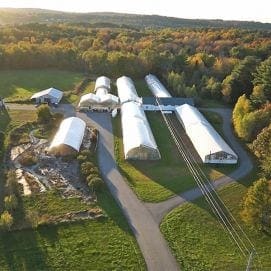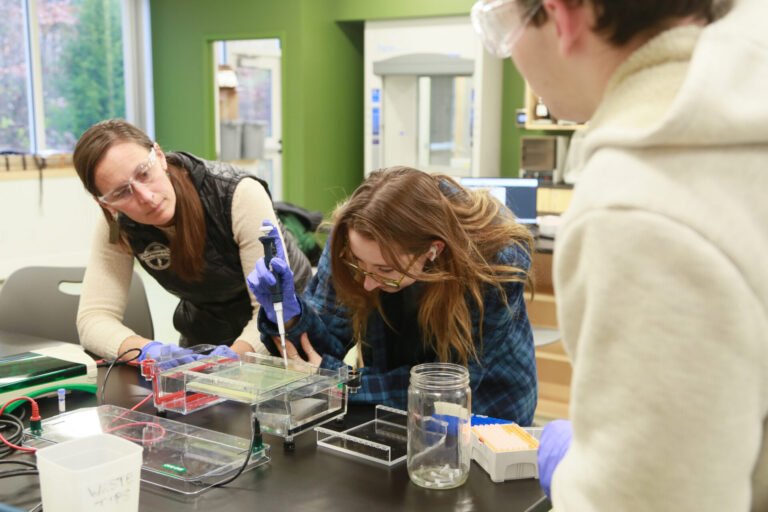
Unity College will use a $40,000 grant from a Maine-based foundation to help upgrade heating systems at McKay Farm & Research Station and move the college further toward its goal of a fossil-fuel-free, carbon-neutral campus.
The grant by The Sandy River Charitable Foundation will pay for site preparation and the purchase and installation of an energy-efficient heat source — either wood pellet or propane heaters — to replace oil-fired furnaces for the facility’s greenhouses.
In a state where the U.S. Department of Agriculture says the number of farmers aged 34 and younger grew nearly 40 percent from 2007 to 2012, compared to 1.5 percent in the United States as a whole, college officials said the grant will increase access to heated greenhouse space for start-up farmers, expand food production capabilities, and extend the growing season to help boost farm-related income, especially for the region’s start-ups and small-scale growers.
“It’s a big win for Unity College, as we get a little bit better every week, every month, every year in attracting like-minded partners who want to see the world achieve a more sustainable future in every aspect in this environmental century,” Unity College President Dr. Melik Peter Khoury said. “Maine-based funders share our sustainability focus and global view, and McKay Farm & Research Station is certainly a bright example of what we’re achieving together.”
Chief Fundraising Officer Erica Hutchinson said the grant offers Unity College “a unique opportunity to retrofit the greenhouses with more energy-efficient heat sources.”
“The benefits of this generous gift will have many multipliers,” Khoury said. “Our students will see how efficient energy sources positively affect the sustainability of small-scale agriculture. Our local agricultural partners will get an upgraded facility that’s more efficient to help them meet their production goals. And for Unity College, our carbon footprint and energy costs will be reduced. But more importantly, we are setting a mark in how to replicate solutions for others to develop sustainable, small-scale community agriculture.”
Unity College Chief Sustainability Officer Jennifer deHart, who oversees McKay Farm & Research Station, said the heating system upgrades will be state-of-the-art and provide local farmers with high-quality greenhouse space.
“This will make McKay Farm & Research Station and Unity College a brighter beacon in showing the way for small-scale community agriculture,” deHart said. “We are constantly looking for best practices in all entrepreneurial aspects of farming, and the Sandy River grant is indispensable in that regard.”
DeHart said the grant will ultimately increase access, stability, and security for local growers, improve quality, quantity and availability of locally-grown seedlings, improve networking between growers, community and the college, and boost the year-round availability of local food, including food for Unity College Dining Services.
“There has been a significant increase in interest and enrollment in the McKay Farm & Research Station Community Greenhouse program over the past two years,” deHart said. “Bench space rentals doubled, and there is more demand for next growing season. This project will allow us to increase our sustainably heated space, so we can meet this demand in a cost-effective manner.”
McKay Farm & Research Station, a multi-faceted greenhouse operation in Thorndike, was gifted to the college by Isabel McKay and Rick Thompson in December 2013, along with five years of financial support — the second largest cash gift donation in the college’s history.
The facility serves as a direct extension of the 225-acre campus, providing Unity College students and the community with educational, research, and entrepreneurial opportunities in sustainable agricultural production and enterprise.
The facility has quickly become a resource for Unity College students as a center for innovative research into challenges faced by rural agricultural enterprises in New England — including energy costs, compensation for workers, climate challenges, marketing, and more.
Partnerships with players in the local food movement have included collaborations with the Maine Organic Farmers and Gardeners Association, Johnny’s Selected Seeds, Fedco Seeds, and local farmers. Activities have included growing trials for Fedco, hosting a Farm to Institution New England summit, and sponsoring a soil-health demonstration project.
This June, faculty and students continued a multi-year partnership with The American Chestnut Foundation by sprouting 650 endangered American chestnut seedlings at the facility, then planting them at restoration sites around central Maine. In April, the facility was home to workshops on natural pest control methods, in partnership with The University of Maine and The Maine Department of Agriculture, Conservation & Forestry.
In April 2015, Cultivating Community, a Portland-based nonprofit organization that operates an incubator farm for immigrant and refugee farmers, contracted Unity College to supply seedlings for their Community Supported Agriculture project, which employs dozens of people and supplies fresh, locally grown food to underserved areas.
“With this grant and the continued popularity of McKay Farm and Research station among our students, community partners, and donors, Unity College has created a popular, inviting, and well-equipped space for the development of sustainable agriculture,” Khoury said. “The opportunities for innovative partnerships, participatory research, and community engagement offered at McKay will help us achieve the education and sustainability mission of America’s Environmental College.”
The Sandy River Charitable Foundation is an invitation-only foundation that actively searches for meritorious funding recipients. The foundation “endeavors to engender the physical and social well being and encourage the human spirit of neighbors throughout the world” with international projects that address the causes of predicament and set forth a process leading to a sustainable, self-sufficient condition, according to its mission statement.
About Unity College
The first institution of higher education in the nation to divest from fossil fuel investments, Unity College is committed to educating the next generation of environmental professionals. Sustainability science lies at the heart of its educational mission, with 16 environmentally focused undergraduate majors and an M.S. in Professional Science degree offered online. For more information, visit unity.edu.



